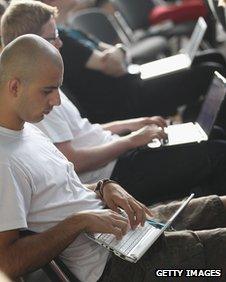Taking risks and spotting opportunities
- Published
Despite the 20-year age gap between them, there are striking parallels between entrepreneurs Martin Varsavsky and Carlos Moncayo.
Both started their business careers while pursuing their studies. Both made their fortunes far from their homelands. And both have profited from great changes in the global economic landscape that they helped bring about.
Yet the two grew up in households with very different attitudes towards those who start their own businesses.
Ecuadorian Mr Moncayo, 31, describes his father as a "relentless entrepreneur", selling handicrafts to home-made honey, and who always involved his family in his projects.
On the other hand, Mr Varsavsky, 52, grew up in an Argentine family where "almost everyone is an intellectual" and who viewed entrepreneurs as "thieves".
"It took me maybe seven years of my life... and maybe four years of therapy to understand that it was OK for me to be an entrepreneur!" he says.
Mr Moncayo made his first million dollars with a company set up to pay his way through college, converting disused industrial space into fashionable loft apartments, and went on to build seven companies - four growing in value to more than $500m (£310m) each.
But life was not always so fortunate for the businessman. When he was 16, a military junta seized power in his native Argentina, crushing opposition. His family were targeted as dissidents and in 1977 they fled to the US.
He believes that this early experience influenced his risk-taking in business.
"After what I went through in my childhood, after growing up without knowing whether you would make it to the next day, after seeing relatives being killed and buildings blow up 100m away from my home, I just have a different idea of what a business risk is," he says.
He made his mark as a telecoms innovator as the industry revolutionised over the past 30 years.

Fon aims to create a global community of wi-fi users
Among the companies he founded are Viatel, which pioneered the call-back system of cheap international calls, and Jazztel, principal challenger to Spain's former monopoly telecoms provider.
He has made a fortune from building and selling companies, but has experienced his fair share of downs as well - narrowly avoiding personal bankruptcy when his Viatel shares crashed in value before rebounding, and losing 35m euros ($45m; £28m) on cloud computing in 2003.
His current venture is Fon, a communal wi-fi network, in which members share their private routers and as a result are able to access the internet for free across the world.
This too has not been trouble-free though as four years ago he was forced to rescue Fon with cash saved from previous ventures.
"I started Fon because I needed wi-fi and then I thought, 'Hey, maybe everyone else needs wi-fi when they move around the world.' So my first advice for you to start a business: start a business that solves a problem that you have," he says.
'A better way'
That is what Mr Moncayo did when, at the tender age of 23, he devised a grand plan to forge a whole new trading relationship between Latin America and China.
He was working as an intern on an eight-week stint at a Shanghai law firm. His job was to decide whether foreign firms' complaints against Chinese manufacturers were valid.
He concluded that many of the disputes could easily have been avoided. Relationships which started off full of "positive intention" became "very complex".
"I was reading all these emails between the companies, and I thought, 'There has to be a better way to do this,'" he says.
Despite knowing very little about manufacturing and unable to speak a Chinese language, he decided to build a career negotiating and supervising deals between firms in his native Latin America and Chinese suppliers. It was an obvious gap in the market.
"We were the first ones to really connect these two regions," he says.
Just eight years later, Mr Moncayo is the chief executive of Asiam Business Group, handling orders from Asia worth $35m (£22m) per year, mainly on behalf of Latin American fashion houses.
Spotting opportunities
China still presents opportunities for foreign entrepreneurs, though they may have to work harder to take advantage of them.
At present Asiam's Latin American clients are at the glamorous end of the operation - designing, marketing and selling the clothes.
But with China exploiting new economic opportunities, Mr Varsavsky believes it is only a matter of time before the Chinese take over the more enviable occupations.
"What's going to happen to the rest of the world when the Chinese not only make everything we use, but design it as well?" asks Mr Varsavsky.
You just look for the right business opportunity, Mr Moncayo replies.
"I think there are a lot of Chinese brands that are becoming very strong on the local market and they really have the quality and design to become international brands," he says.
"We're looking right now at opportunities of these Chinese brands going internationally to partner with them, because they definitely need other local knowledge and they want to build networks of people that they could trust."
The Ideas Exchange is an eight-part series, starting on 1 September, broadcast on BBC World News on Saturdays at 02:30 and 15:30, and Sundays at 09:30 and 21:30 (all times GMT).
Every week, two international business leaders meet to talk about their different experiences of global markets and business.
- Published6 September 2012
- Published29 August 2012